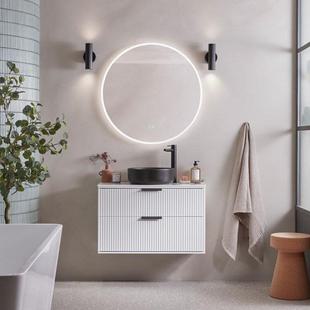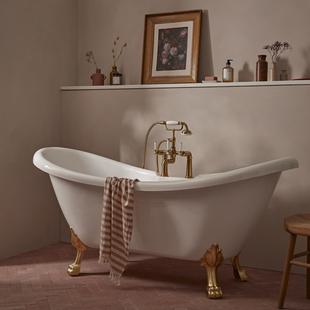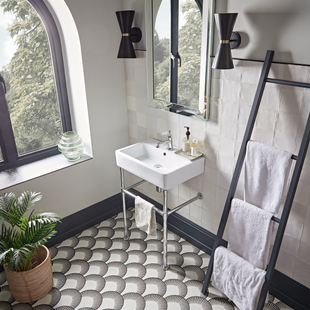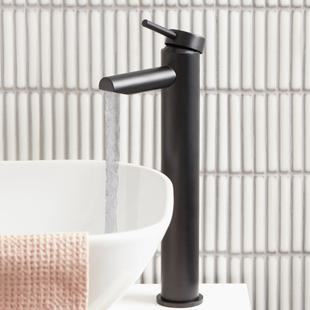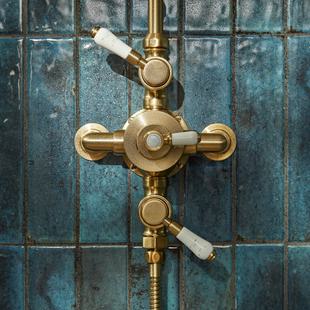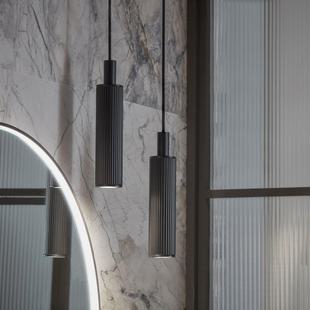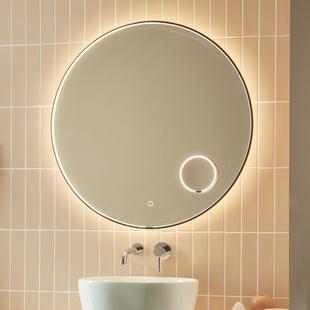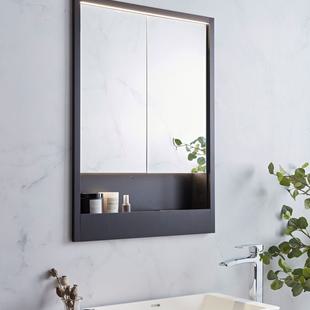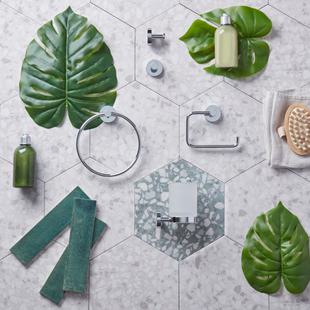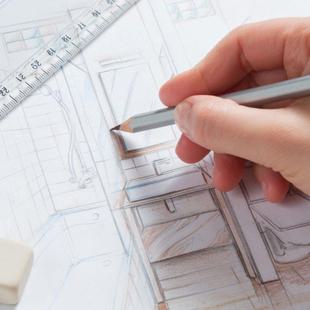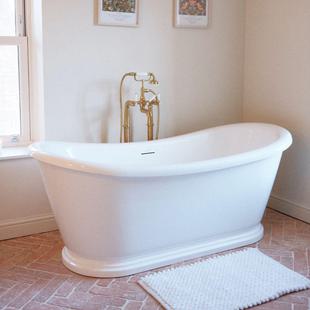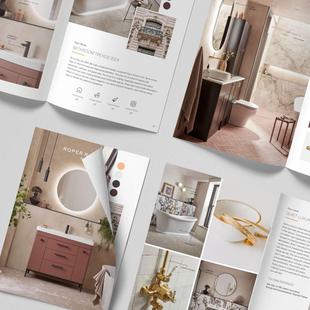- NEW
-
Bathroom Furniture
Bathroom Furniture TypesBathroom Furniture StylesBathroom Furniture Finishes
- Baths
-
Basins & WCs
Basin TypesBasin & WC Styles
-
Taps
TAP TYPESTAP STYLES
- Showers
-
Lighting
Smart Lighting Solutions
-
Mirrors
-
Cabinets
Cabinet TypesCabinet Styles
-
Accessories
Accessory Types
-
Guides & Ideas
InspirationBathroom Style
- NEW
-
Bathroom Furniture
Bathroom Furniture TypesBathroom Furniture StylesBathroom Furniture Finishes
- Baths
-
Basins & WCs
Basin TypesBasin & WC Styles
-
Taps
TAP TYPESTAP STYLES
- Showers
-
Lighting
Smart Lighting Solutions
-
Mirrors
-
Cabinets
Cabinet TypesCabinet Styles
-
Accessories
Accessory Types
-
Guides & Ideas
InspirationBathroom Style
Tasteful Victorian Bathroom Ideas to Inspire You
In many ways, the Victorian bathroom has served as the foundation for modern bathroom design as we know it. While many rooms in the typical Victorian home were often dark, cluttered and heavily decorated, by contrast, Victorian bathrooms were far more practical but no less beautiful. The Victorian style bathroom combined clean lines with beautifully crafted fittings and fixtures and a love for opulent surface and tile choices, to create a unique style that continues to appeal today.
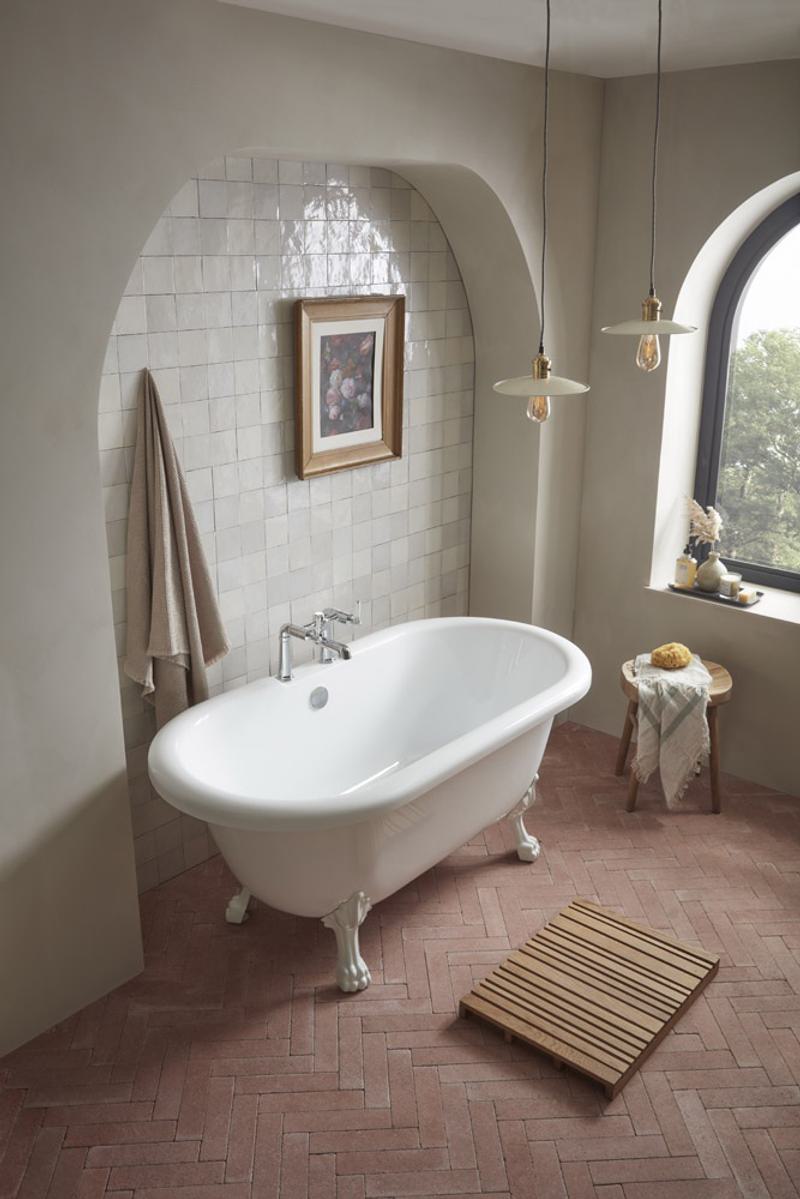
Traditional Warmth
There is a common misconception that Victorian bathrooms are cold - but this warm and inviting traditional bathroom design proves otherwise. To create the look, we combined tactile zellige tiles in a pearlescent white with real terracotta herringbone flooring. A traditional Victorian-inspired clawfoot bath is the centerpiece of the room, with Victorian industrial lighting and gilt-framed artwork completing the look.
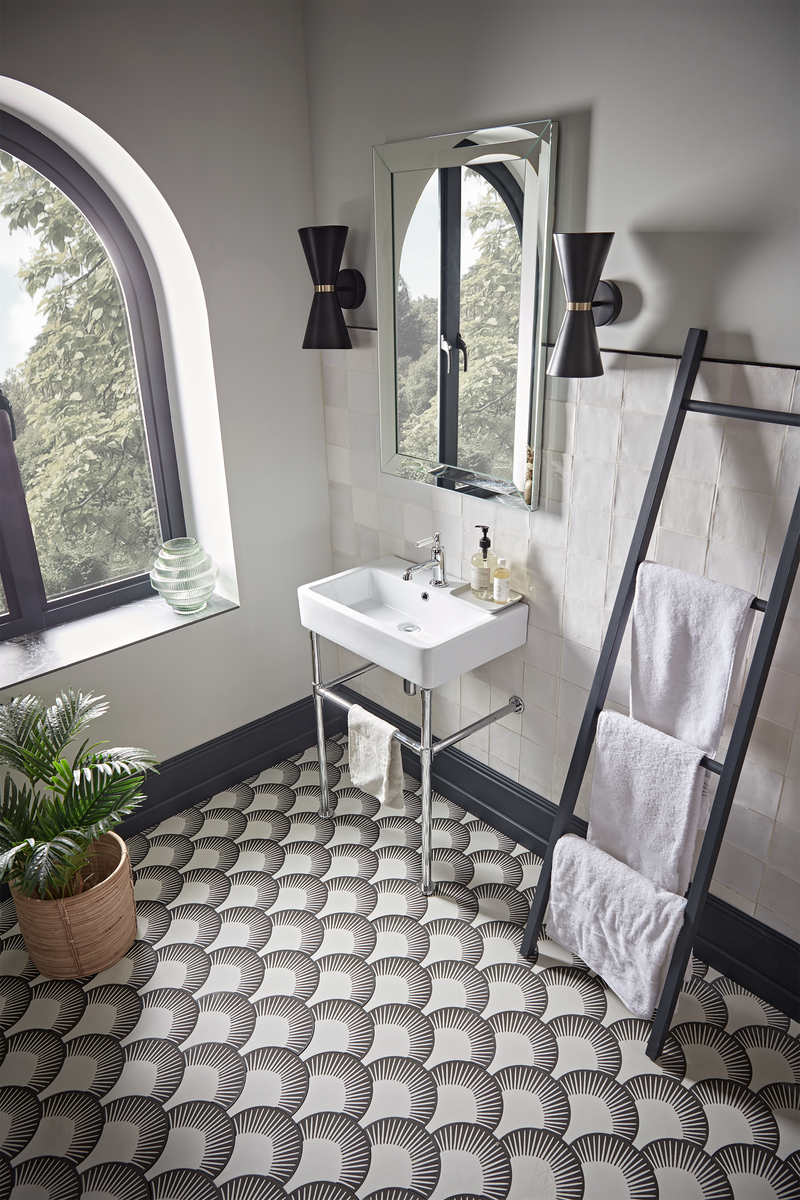
An Eclectic Mix
Mixing tiles of different patterns and textures is key to recreating this traditional look. Our designer Zoe opted to use flat fronted art deco inspired floor tiles, alongside variated, lustrous zellige wall tiles. Adding a period style skirting board in Farrow & Ball ‘Downpipe’ helped to marry these two otherwise clashing styles and created an elegant, layered look. Likewise, using a dark caulk along the half-height tile wall mirrored the moulding to complete the look. You can even layer your brassware- why not mix metallics and combine brass and chrome taps and bath fillers to recreate the lived in charm of the Victorian bathroom.
Victorian Bathroom Ideas
3 Beautiful
With such a range of styles and interpretations, it's easy to be overwhelmed by the volume of Victorian bathroom ideas. If you're looking for Victorian bathroom inspiration, it's important to consider your own personal tastes, your bathroom layout, and whether this distinctive style sits well within the overall design of your home. Fortunately, with the right treatment, Victorian style bathrooms can be quite stylistically versatile, allowing for neutrals or colour, light or dark, opulence or simplicity.
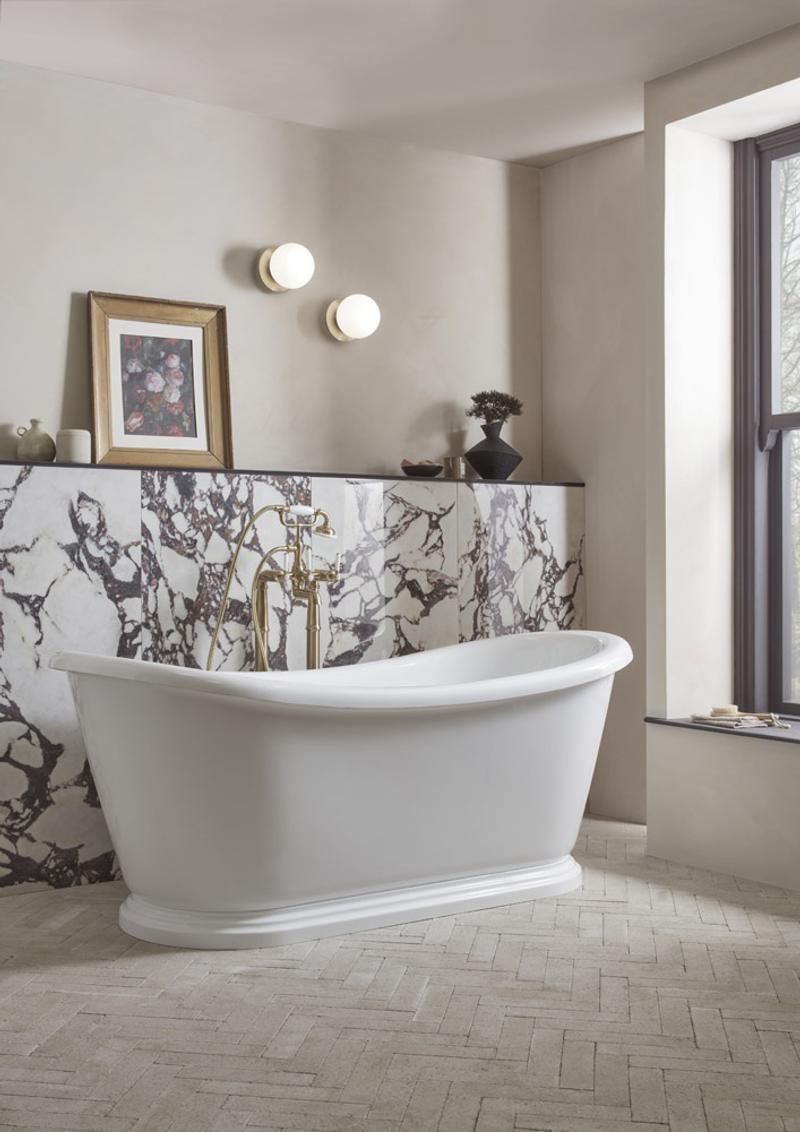
Quiet Luxury
The perfect Victorian bathroom is difficult to achieve, but this striking yet elegant traditional bathroom suite is a strong contender. A beautiful play of light and dark, our designer Zoe added drama to an otherwise neutral bathroom suite by incorporating burgundy veined marble tiles to complement the simplicity of the natural stone flooring. The soft curves of the Bateau bath are the perfect counterpoint to the linear elements of the room, while a lustrous brass bath filler tap is the perfect finishing touch.
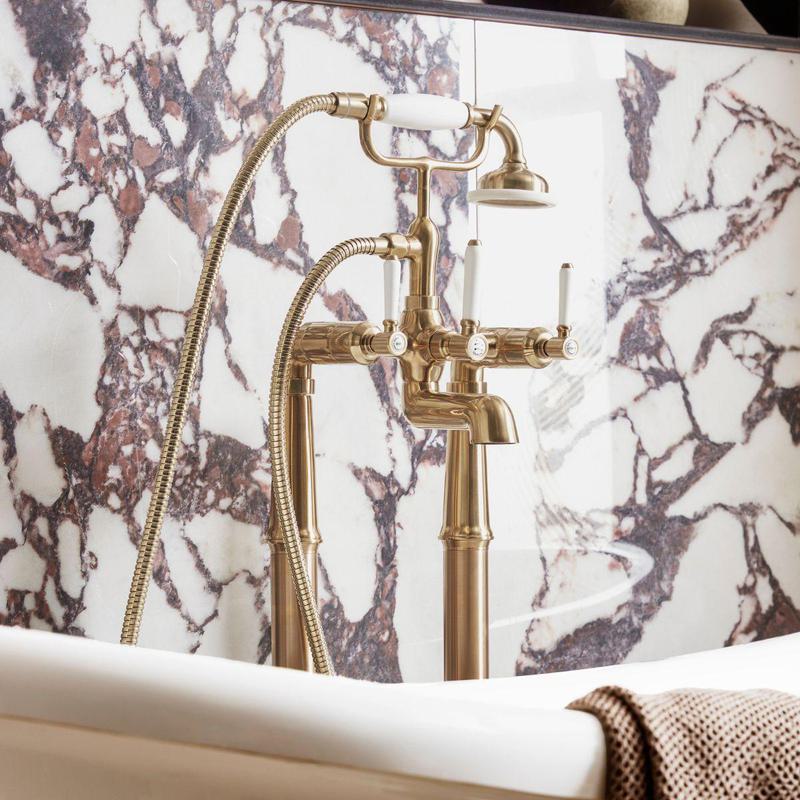
What is a Victorian-style bathroom?
A new culture of personal hygiene in the mid-19th century led not only to the development of sewage and supply networks but also, in turn, the evolution of bathroom design. From gravity fed high-level toilets to the first roll-top bath, the bathroom became a place for product design and, critically, decor. Where bedrooms and living rooms were ornamental and lavish, Victorian period bathroom decor was minimalist by comparison. Today, the style effortlessly combines simplicity and decadence. Victorian bathrooms typically feature a brass washstand or traditional bathroom vanity, antique brass fittings, a two part high level toilet, and a freestanding bath.
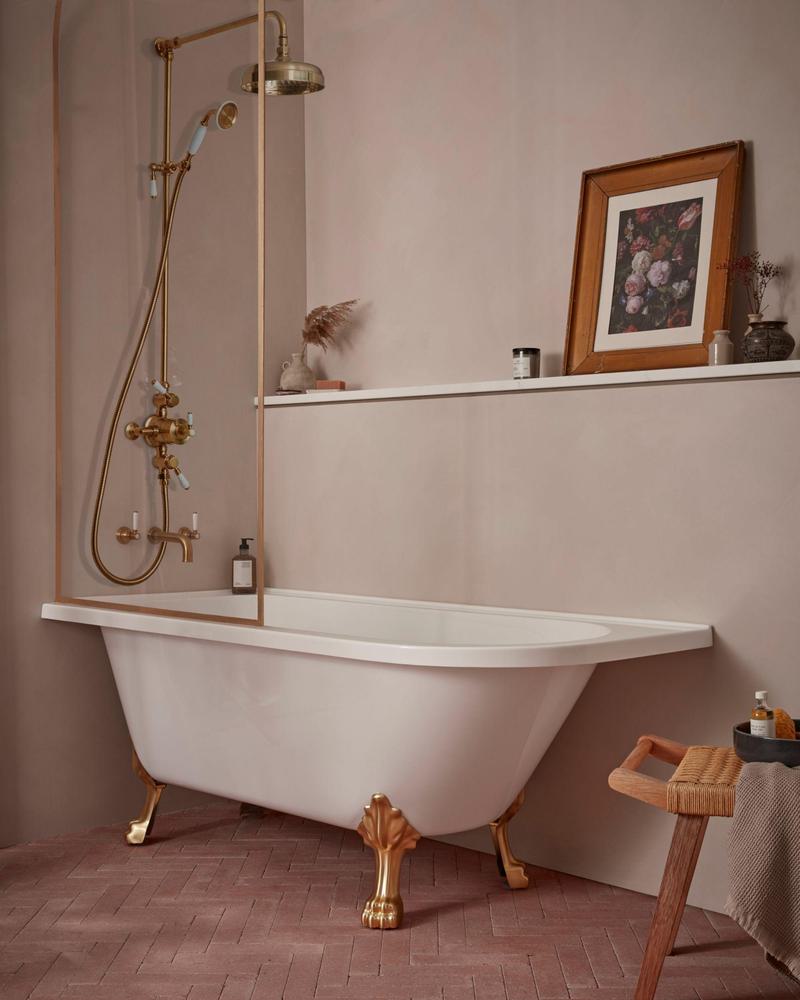
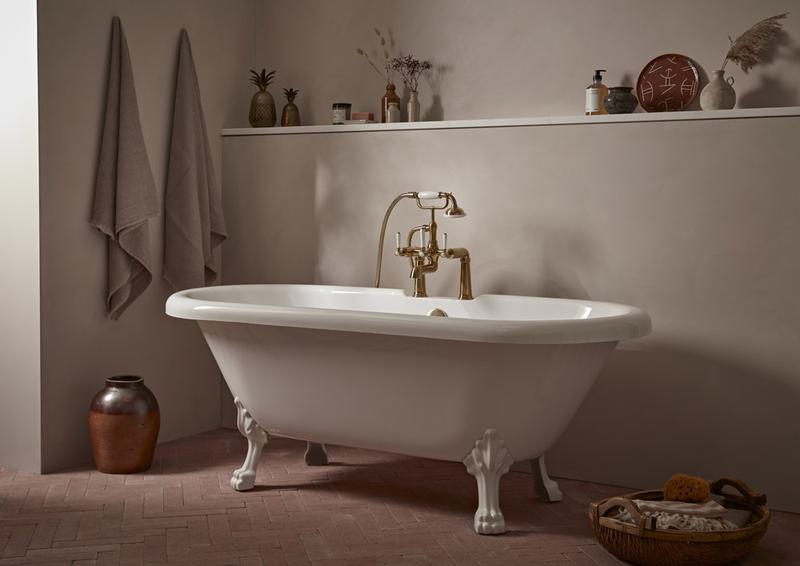
Victorian Baths
Widcombe
A classically inspired collection of baths, reimagined for the modern home. With all the era-defining details you would expect, our Widcombe bathtubs offer ample space for customisation. Create a bath unique to you by choosing from our extensive range of accessories and components, available in multiple complementary finishes.
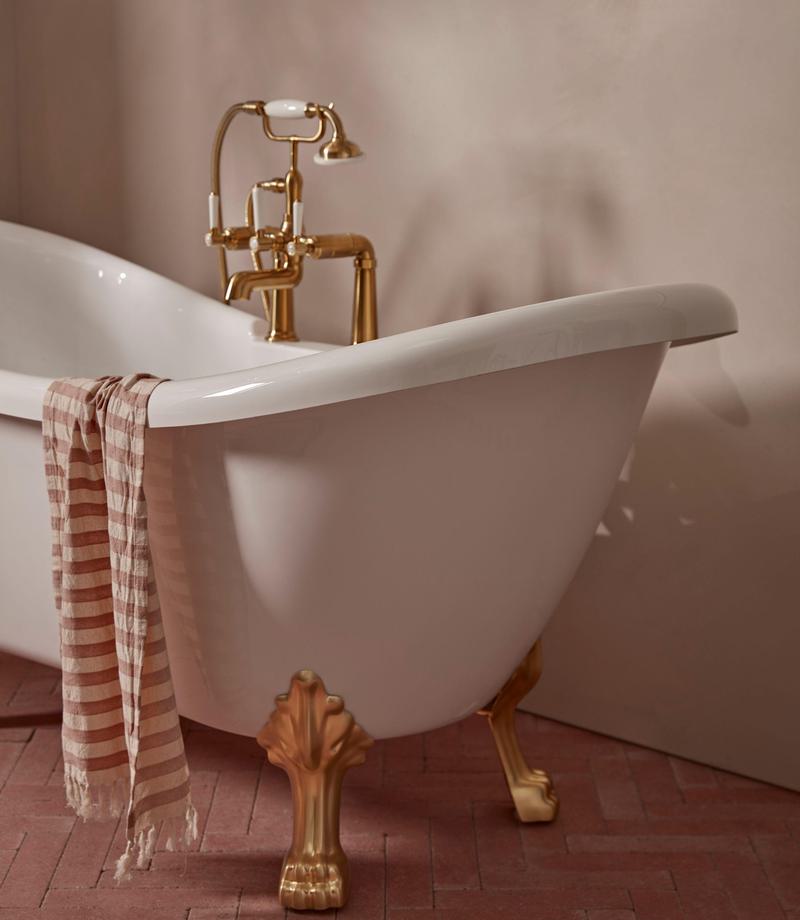
Victorian Bath Styles
A defining feature of the Victorian bathroom, the Victorian bathtub is equal parts function and luxury. Although the style may have dated from the early 1800s, the Victorian style of bath design is an enduring classic and remains popular with homeowners even today.
Freestanding Baths
While there are a number of styles of Victorian tub, they all share a freestanding bath frame. Where contemporary baths are often attached to a wall, an alcove or boxed in using bath panels, the original Victorian freestanding baths did not require plumbing and as such could be positioned independently of other fixtures in the bathroom. Seen in both double-ended and single-sided styles, the Victorian era freestanding bath
Even as time progressed and plumbed bathrooms became commonplace, the freestanding bath retained its enduring style and is now available both in the traditional Victorian style of bath as well as more contemporary oval, square, and curved iterations of the bath design.
Slipper Baths
Slipper baths, also known as roll-top baths, are a classic design element of Victorian period bathroom design. With their elegant and timeless design, slipper baths have become a popular choice for homeowners looking to add a touch of luxury and elegance to their bathrooms. Known for its distinctive shape, which is characterized by a raised back and a gently curved interior, this design provides a comfortable and supportive place to relax, while also adding a touch of sophistication to the bathroom.
Claw Foot Baths
Closely related to the slipper bath is the Victorian claw foot bath. Curved in style, the claw foot bath features intricate and decorative claw feet that are both functional and aesthetically pleasing. Elevated off the floor, the distinctive design of this Victorian bath is said to have been inspired by similar trends in Victorian furniture that originated in Holland in the 1800s. Originally made from cast iron and painted, modern versions of the Victorian clawfoot bath are usually constructed from lightweight and heat-retaining acrylic, making it a much more practical and affordable option for those looking to recreate a Victorian style bathroom.
Boat Baths
Boat baths, also known as 'Bateau Baths', are a type of freestanding bathtub that were popular during the Victorian era and continue to be a popular choice for those seeking a Victorian style bathroom design. The name 'boat bath' or 'bateau bath' (bateau being the French word for boat) comes from the distinctive shape of these tubs, which resemble the hull of a boat. Typically symmetrical with both ends sloping and allowing for reclining at either end, boat baths can be found in a variety of materials, with modern versions of the style most commonly made from acrylic. They can range in size from more compact options to grand, opulent freestanding baths. In addition to their aesthetic appeal, boat baths are also appreciated for their deep basins, which allow for full immersion and a luxurious bathing experience. Today, boat baths are a popular choice for those looking to recreate the charm of the Victorian bathroom and serve as a beautiful centerpiece in a bathroom design, adding character and style to the space.
Victorian Bathroom Furniture
Likely the most popular style of traditional bathroom furniture, Victorian bathrooms often feature a traditional vanity unit in a decorative style. Era-defining details such as ornamental mouldings, inlay panels, and carved skirting are all indicative of Victorian bathroom design and could be found primarily in stained native wood. Today, traditional bathroom vanity units are available in a much wider range of finishes, from neutral greys and whites to bolder greens and blues. Equally, storage was likely a secondary consideration in Victorian times, whereas classic bathroom furniture of today comes equipped with ample drawer and shelving space to meet the demands of the modern bathroom.
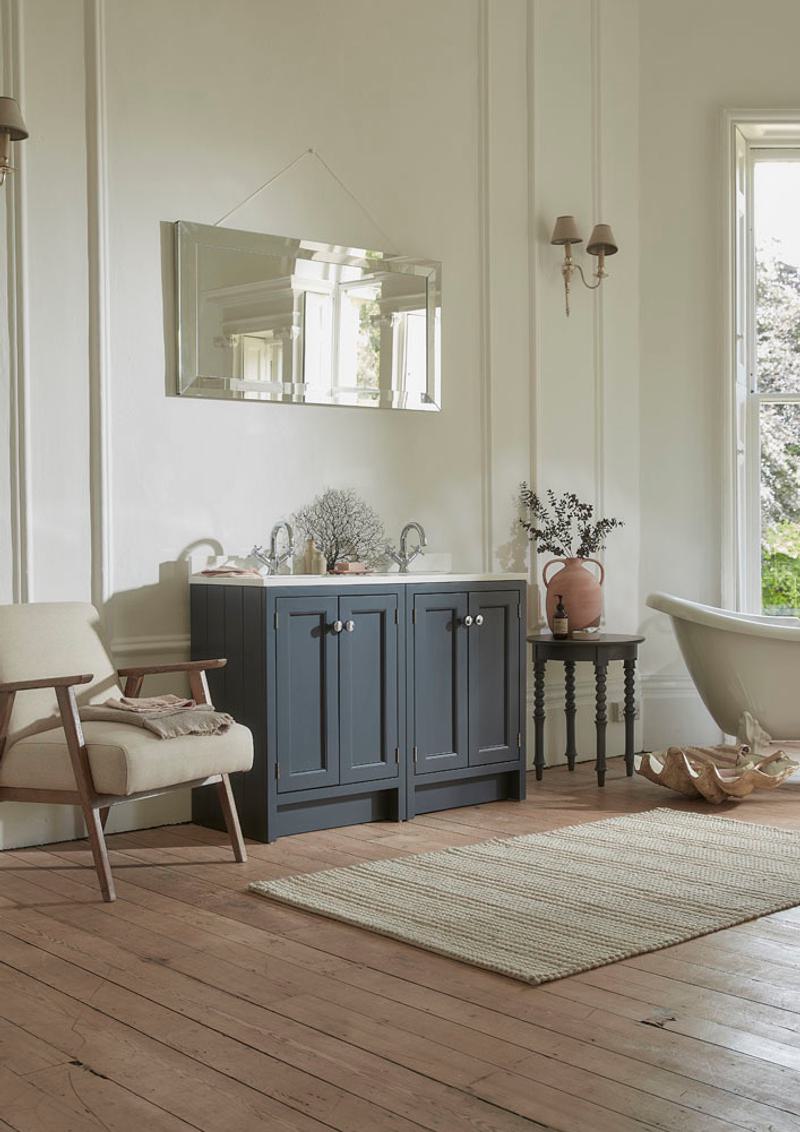
Victorian Furniture
Hampton
A smartly tailored, historically inspired collection of bathroom furniture, available in a wide range of tasteful finishes. With soft-close cupboard cabinet doors and interior shelving, our Hampton furniture collection offers style and substance.
VIEW HAMPTON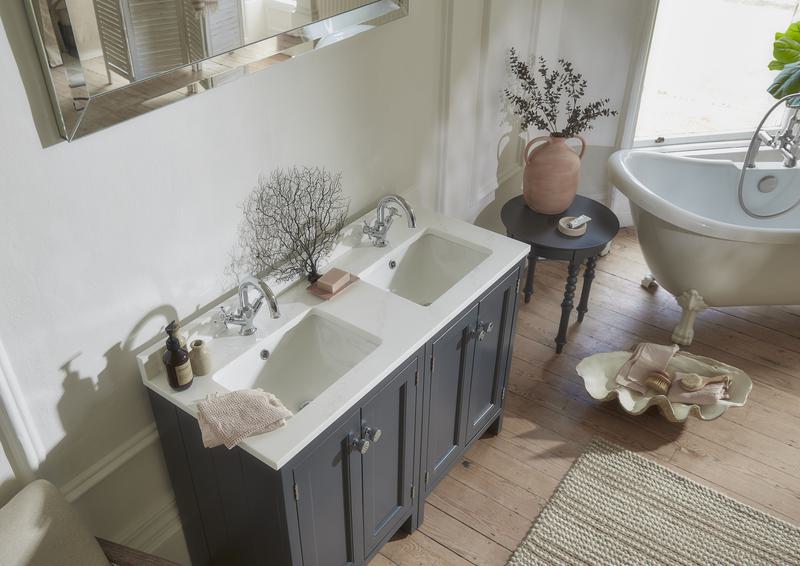
Victorian Taps and Showers
Exposed pipework and rich, lustrous finishes are the hallmarks of Victorian brassware. Victorian showers can be identified by their bell-style shower heads and exposed valve design- making an elegant feature of a functional product, while Victorian-style pillar taps often featured ceramic inlay detailing and ball terminal levers. Today, there is a wide variety of Victorian taps and showers to choose from, with both exposed valve and concealed valve options available, as well as the option for traditional basin mixer styles. Opt for brass tap and shower styles to keep the look decadent and traditionally Victorian.
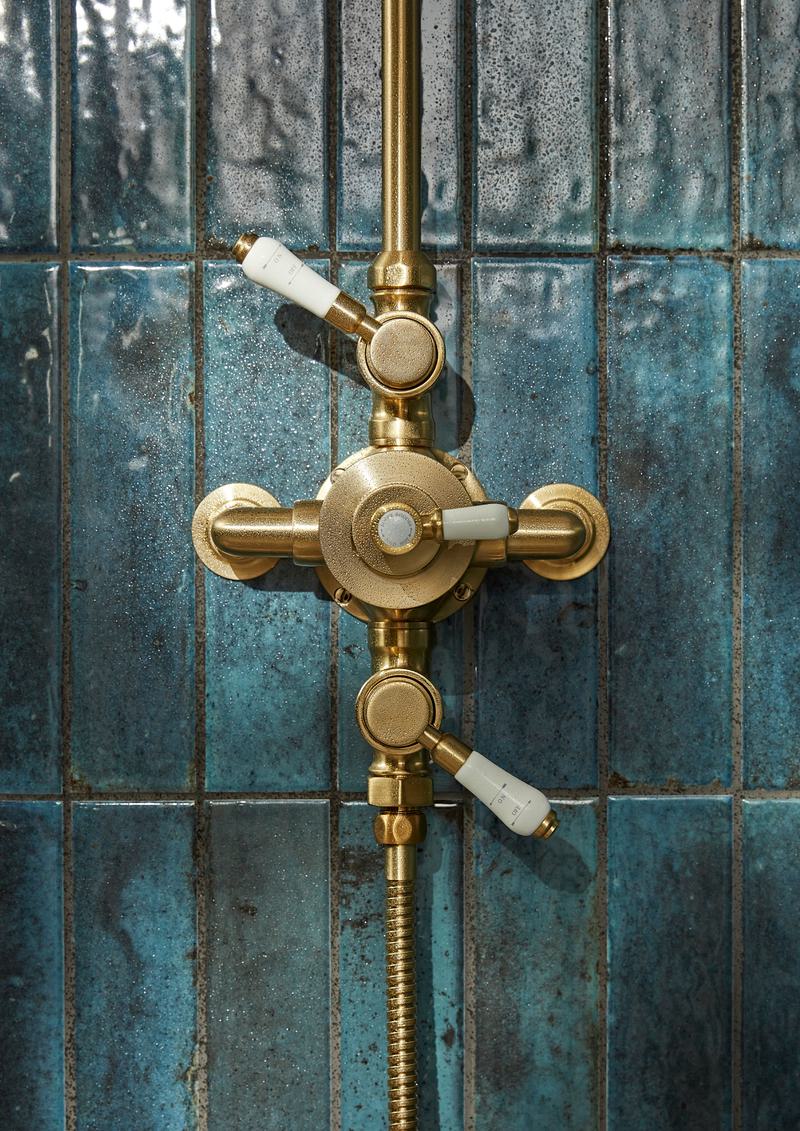
VICTORIAN SHOWERS
Keswick
With concealed valve and exposed valve options available, the Keswick shower collection sits perfectly between contemporary and classical design. Subtle features such as ceramic grip levers and rounded, traditional fittings evidence the ranges exemplary design.
VIEW KESWICK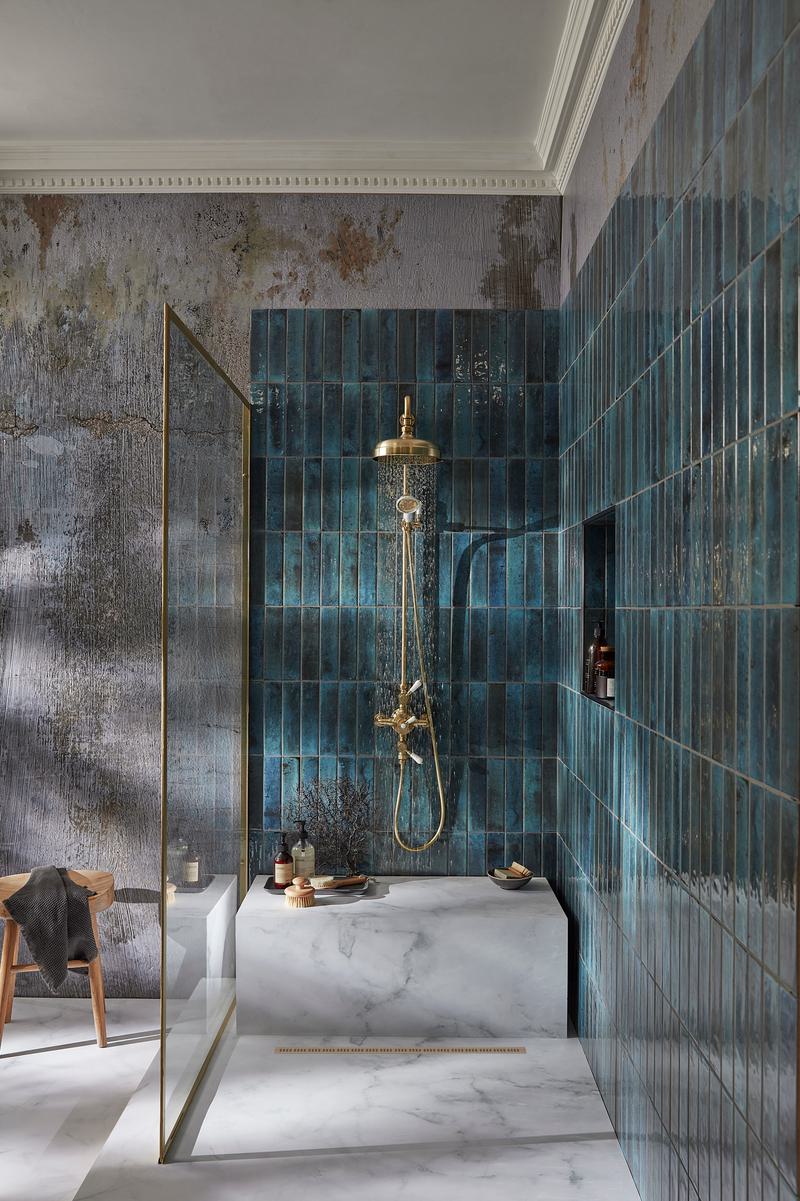
Victorian Toilets
The quintessential Victorian toilet features a high-level cistern, connected to a low-level pan by exposed pipework. Although primarily designed for function, the Victorian WC is elegant in form and often includes detailed metalwork around the cistern wall brackets and flush chain, making it equal parts practical and decorative. Recreate the look in your home by opting for a high-level cistern style and a traditional ceramic pan, and coordinate with a traditional wooden toilet seat to complete your Victorian suite.
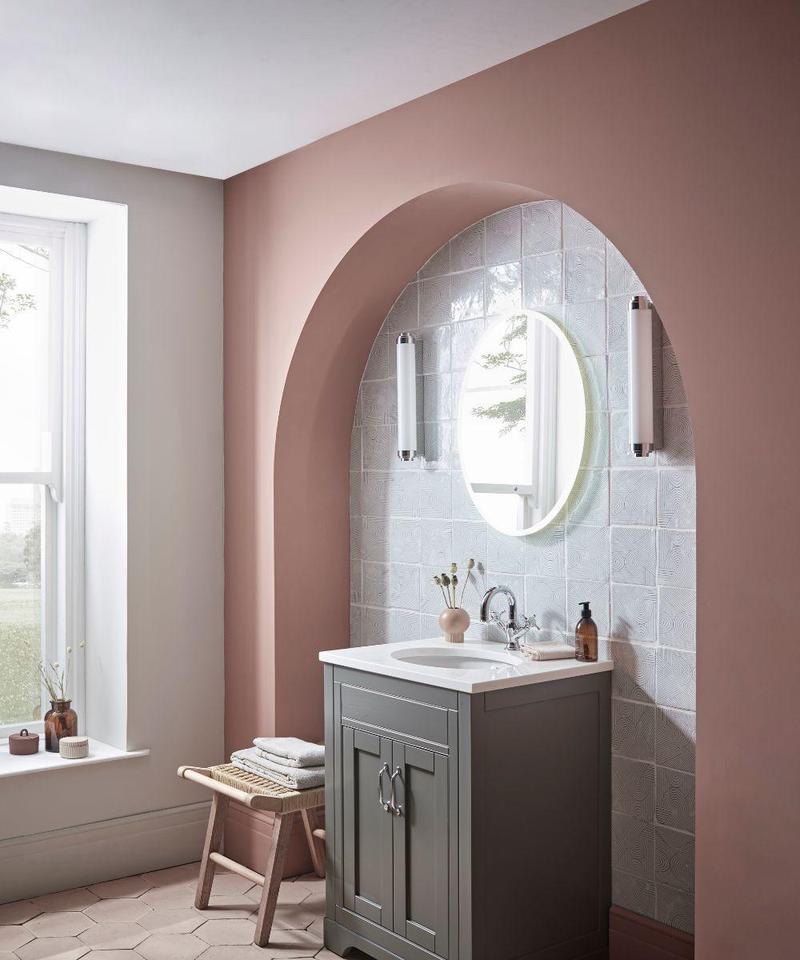
Victorian Bathroom Lighting
Another typical feature of Victorian bathroom style is the use of statement lighting, such as chandeliers or sconces. Victorian lantern styles, which are frequently designed with decorative or patterned glass, owe their distinct design to the use of kerosene, which required that the glass shade point upward. Fortunately, this is a design feature we don’t have to consider today, with bathroom lighting available in a wide range of styles inspired by the era.
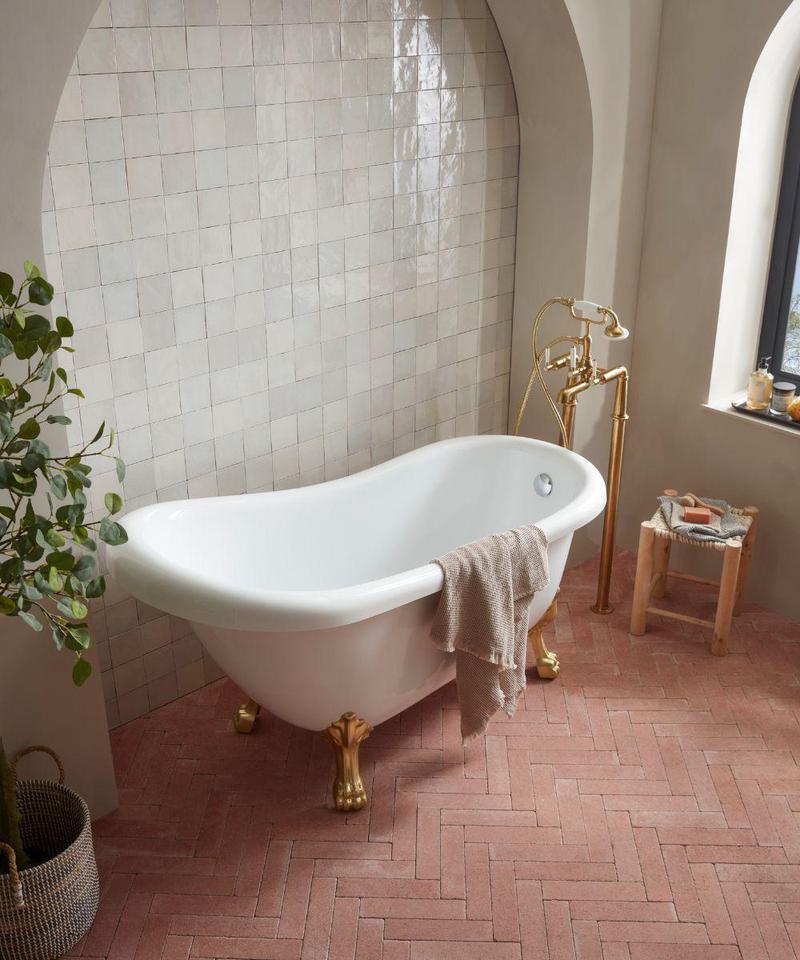
Victorian Bathroom Tiles & Flooring
The Victorian era saw the use of bold and opulent tile and flooring design, from pattern floors to glossy wall tiles in jewel tones that can still be seen in contemporary bathrooms today. Parquet and herringbone floors grew in popularity, while the quintessential checkerboard Victorian tile also came to the fore - being at once beautiful and practical. For the walls, simple vertical or metro tiles are a popular choice for this Victorian bathroom style, particularly green tiles, white tiles or dark blue tiles in glossy finishes. To recreate Victorian bathroom tiling, opt for a half-tiled wall with a complimentary tile trim for an authentic look.

-
Victorian Wall Decor
Wall panelling, wainscoting and board & batten were other common features of Victorian style bathrooms, introducing warmth and interest to bare walls.
-
Victorian Wall Decor
Wall panelling, wainscoting and board & batten were other common features of Victorian style bathrooms, introducing warmth and interest to bare walls.
Victorian Walls & Panelling
Travel and exploration heavily influenced Victorian bathroom decor, and this is especially obvious through the use of colourful, mural style wallpaper. The mass production of textiles and paper meant that many could afford to decorate their bathrooms with flock and damask wallpaper or large, bold prints of flowers and foliage, adding drama and luxury to an otherwise sparse bathroom scheme. Wall panelling, wainscoting and board & batten were other common features of Victorian style bathrooms, introducing warmth and interest to bare walls.
How to create a Victorian style bathroom
Modern interpretations of the Victorian bathroom differ greatly in terms of adherence to traditional style, but there are a few key features that typify this timeless design. From checkerboard flooring to demask wallpaper, read on to discover how to create a Victorian style bathroom from the ground up.
Creating a Victorian-style bathroom in your home involves a blend of traditional elements and modern amenities. Here are some steps to help you achieve this.
Remember, creating a Victorian-style bathroom is about balance. While it's important to incorporate traditional elements, it's equally important to ensure the space is functional and meets your needs. You can also add modern amenities like heated towel rails or underfloor heating for added comfort.
Bathtubs
The centerpiece of a Victorian bathroom is often a freestanding bath. Slipper baths, clawfoot baths, or bateau baths are all excellent choices to appropriately furnish your traditional bathroom.
Walls & Panelling
Victorian decor was heavily influenced by travel and exploration, which is evident in the use of colorful, mural-style wallpaper. Wall panelling, wainscoting, and board & batten were other common features of the Victorian bathroom.
Toilets
The quintessential Victorian toilet features a high-level cistern, connected to a low-level pan by exposed pipework. This design is both practical and decorative.
Taps and Showers
Exposed pipework and rich, lustrous finishes are the hallmarks of Victorian brassware. Victorian showers can be identified by their bell-style shower heads and exposed valve design, while Victorian-style pillar taps often feature ceramic inlay detailing and ball terminal levers.
Victorian Bathroom Furniture
Victorian bathrooms often feature a traditional vanity unit in a decorative style. Era-defining details such as ornamental mouldings, inlay panels, and carved skirting are all indicative of Victorian bathroom design.
Victorian Lighting
Statement lighting, such as chandeliers or sconces, is another typical feature of Victorian bathroom style. Victorian lantern styles, which are frequently designed with decorative or patterned glass, are a distinct design feature.
Accessories
To complete the look, consider adding a large, ornate mirror, brass or copper fixtures, and vintage accessories like soap dishes, towel rails, and toothbrush holders.
Tiles & Flooring
Victorian bathrooms often feature bold and opulent tile and flooring designs. Checkerboard tiles, parquet, and herringbone floors were popular during the Victorian era. For the walls, simple vertical or metro tiles are a popular choice, particularly in green, white, or dark blue.
